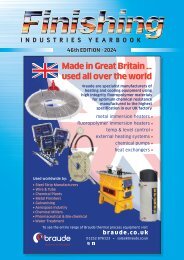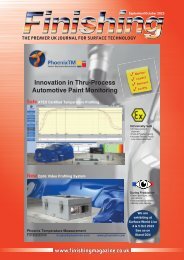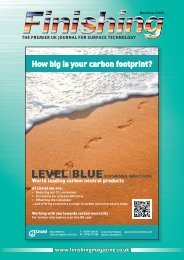International Aquafeed Directory 2023-24
Welcome to the 27th edition of the International Aquafeed Directory & Buyers’ Guide 2023/24, the essential guide for everyone involved in the global aquafeed industry. Last year I wrote about the effects of the war, and the challenges resulting from rising fuel costs, but the industry showed great resilience. The impact of inflation and reduced consumer spending dampened growth in the market at the beginning of the year, but an expected increase in aquaculture production will compensate for a mall decline in wild catches. This edition contains information relating to 450+ businesses and over 850 products, coupled with useful and practical information including the extruder and expander guide. We would like to take this opportunity to thank all the businesses that have contributed to the completion of this directory. I also hope that all of our readers across the world remain safe and well.
Welcome to the 27th edition of the International Aquafeed Directory & Buyers’ Guide 2023/24, the essential guide for everyone involved in the global aquafeed industry.
Last year I wrote about the effects of the war, and the challenges resulting from rising fuel costs, but the industry showed great resilience. The impact of inflation and reduced consumer spending dampened growth in the market at the beginning of the year, but an expected increase in aquaculture production will compensate for a mall decline in wild catches.
This edition contains information relating to 450+ businesses and over 850 products, coupled with useful and practical information including the extruder and expander guide.
We would like to take this opportunity to thank all the businesses that have contributed to the completion of this directory. I also hope that all of our readers across the world remain safe and well.
Create successful ePaper yourself
Turn your PDF publications into a flip-book with our unique Google optimized e-Paper software.
15<br />
AQUACULTURE ASC AQUACULTURE<br />
Digital traceability of shrimp through ASC’s Key Data Element project<br />
Feed industry operations contribute to<br />
the economic backbone of the local<br />
communities in which they are located.<br />
Therefore, another core requirement<br />
for feed mills is adhering to social<br />
responsibility. This includes fair<br />
treatment and wage of employees,<br />
respect of indigenous and tribal people’s<br />
rights, and ensuring that no child or<br />
forced labour exists. The ASC<br />
Feed Standard includes many other<br />
social and effective management system<br />
requirements, including policies,<br />
procedures and processes for topics such<br />
as the prevention of corruption, bribery,<br />
or falsification of documents.<br />
ASC certified feed mills are also<br />
required to conduct Due Diligence on<br />
their supply chains to assess and<br />
mitigate these key social risks.<br />
From January this year, feed mills have<br />
been able to apply for certification to<br />
ASC’s Feed Standard which covers legal,<br />
social, and environmental requirements<br />
for both the feed mill’s own operations<br />
and for the suppliers of ingredients used<br />
in their feed production. ASC certified<br />
farms have until January 14th, 2025 to<br />
switch to ASC compliant feed to continue<br />
meeting the ASC Farm Standards.<br />
By requiring responsible sourcing for<br />
all major feed ingredients, ASC aims to<br />
address issues in both the supply chain<br />
and at raw material level. Requirements<br />
on reporting of performance will also<br />
improve assurances by creating<br />
unrivalled transparency throughout the<br />
entire aquafeed supply chain, as well as<br />
rewarding environmental sustainability<br />
and assisting future research into<br />
responsible feed.<br />
Ensuring the feed used by the<br />
aquaculture sector is sourced<br />
responsibly through the holistic<br />
approach set out in the ASC Feed<br />
Standard is essential to achieving<br />
sustainable aquaculture. Given the<br />
increasing importance of farmed seafood<br />
within global food systems, this has<br />
become ever more crucial as the<br />
population of the world increases.<br />
To farm seafood responsibly demands<br />
that the ‘upstream’ impacts associated<br />
with the production of feed ingredients<br />
be monitored and reduced, with an<br />
imperative focus on social responsibility<br />
and environmental improvement. This is<br />
exactly the role that the new ASC Feed<br />
Standard will play by incentivising these<br />
improvements.<br />
Certified feed mills must source environmentally<br />
responsible marine and<br />
terrestrial ingredients. The ASC Feed<br />
Standard uses an improvement model<br />
for marine ingredients which requires<br />
feed mills to source increasingly from<br />
responsibly managed fisheries over time.<br />
MarinTrust and Marine Stewardship<br />
Council (MSC), both full members of<br />
the ISEAL Alliance, play a crucial role in<br />
this mechanism and form the key<br />
steppingstones for improvement.<br />
The model offers a unique opportunity<br />
for feed mills to work together with their<br />
fish meal and fish oil suppliers to meet<br />
the increasing requirements over time.<br />
Ultimately, the majority of volume of<br />
marine ingredients needs to be derived<br />
from MSC fisheries.<br />
For terrestrial plant ingredients such<br />
as soy or wheat, feed mills are required<br />
to record and report all ingredients that<br />
make up over 1% of feed and will need<br />
to take steps to ensure they have been<br />
responsibly sourced. Similarly, feed<br />
mills must also work and commit<br />
towards ensuring their supply chains<br />
become free from risks of deforestation<br />
or land conversion.<br />
Moreover, ASC certified feed mills will<br />
have to record and report their energy<br />
use and greenhouse gas emissions and<br />
work to improve energy efficiency, use of<br />
renewables, and water usage.<br />
Key Data Elements project<br />
facilities digital traceability<br />
for shrimp<br />
Digital supply chain traceability of ASC<br />
certified shrimp products has become a<br />
reality, thanks to ASC’s Key Data<br />
Elements (KDE) project. By harnessing<br />
the power of technology to improve<br />
visibility of each product’s route to<br />
market, retailers will have a higher level<br />
of programme assurance through<br />
increased farm origin and supply chain<br />
data transparency.<br />
The groundbreaking project has<br />
developed software to digitally capture<br />
and convey key data from ASC certified<br />
farms and feed sources, through<br />
processing, packaging, and transport to<br />
retailers. As product is moved, the data<br />
is transferred digitally along the supply<br />
chain, from one company to the next,<br />
using a unique code.<br />
To achieve this goal, ASC has worked<br />
closely with supply chain company<br />
partners, stakeholders, and large-scale<br />
seafood traceability initiatives such as<br />
the Global Dialogue on Seafood<br />
Traceability (GDST), to ensure that the<br />
project is aligned and has shared<br />
objectives and outcomes.<br />
The KDE Project is a huge part of<br />
ASC’s continuous efforts to increase<br />
integrity and assurance for ASC certified<br />
and labelled shrimp products as they<br />
move through the supply chain. The<br />
data transmitted digitally ensures not<br />
only transparency and traceability across<br />
the supply chain but the ability to also<br />
INTERNATIONAL AQUAFEED DIRECTORY <strong>2023</strong>/<strong>24</strong>

















